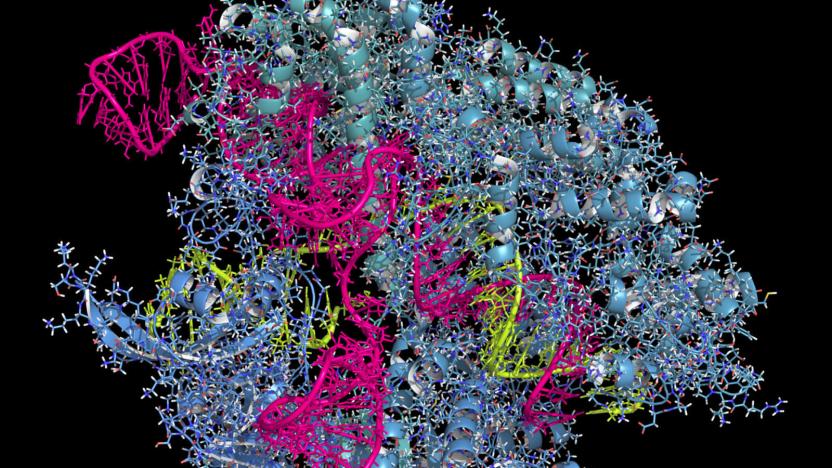CRISPRCas9
Latest

Chinese scientist claims he edited babies' genes with CRISPR
A Chinese scientist claims to have created the world's first genetically-edited babies using the CRISPR/Cas9 tool. He Jiankui (pictured) told the Associated Press that twin girls, Lulu and Nana, were born earlier this month following embryo-editing using CRISPR to disable the CCR5 gene, which allows the HIV virus to infect cells. An American scientist, Michael Deem, also reportedly assisted He on the project at the Southern University of Science and Technology of China.

Researchers can track cell development through 'genetic barcodes'
A newborn is composed of roughly 26 billion cells when he or she enters the world naked, screaming and rather gooey. Figuring out how those multitudes of cells came to be from a single zygote remains among the greatest challenges in developmental biology. But researchers from the Wyss Institute at Harvard University may have finally cracked the code -- through the novel use of CRISPR technology to generate a genetic barcode.

CRISPR might cause more unintended DNA damage than we thought
A new study published today in Nature Biotechnology warns that CRISPR may not be the ultra-specific gene editor we've believed it to be. With CRISPR-Cas9, researchers can find particular sequences in a cell's DNA and cut them at a specified spot. The cell can then repair the DNA where it was cut and scientists have been attempting to use this technique to treat all sorts of diseases and disorders including ALS, Huntington's disease, HIV and sickle cell disease. The method has been thought to be rather specific, allowing scientists to target and remove only certain sequences while leaving surrounding DNA intact. But this new study says that CRISPR-Cas9 gene-editing might be causing more damage than previously reported.

Researchers use CRISPR to detect HPV and Zika
Science published three studies today that all demonstrate new uses for CRISPR. The gene editing technology is typically thought of for its potential use in treating diseases like HIV, ALS and Huntington's disease, but researchers are showing that applications of CRISPR don't stop there.

Key CRISPR gene editing methods might not work for most humans
At first glance, CRISPR gene editing looks like the solution to all the world's ills: it could treat or even cure diseases, improve birth rates and otherwise fix genetic conditions that previously seemed permanent. You might want to keep your expectations low, though. Scientists have published preliminary findings indicating that two variants of CRISPR Cas9 (the most common gene editing technique) might not work for most humans. In a study, between 65 percent and 79 percent of subjects had antibodies that would fight Cas9 proteins.

Gene editing could make wheat safe for celiac sufferers
Celiac disease is thought to affect 1 in 100 people worldwide. Although doctors are still grappling with the causes of the autoimmune disorder, one thing is for sure: If you're diagnosed it with it, you should avoid gluten. But maintaining long-lasting dietary changes isn't easy -- especially when you have to discard some of the most common food items, like bread. Fortunately, hope may be at hand, thanks to good old science. Using gene-editing, researchers from Spain's Institute for Sustainable Agriculture are creating new types of wheat that reduce immune reactions in celiac disease sufferers.

CRISPR gene-editing could result in more successful birth rates
Gene-edited human embryos are offering new insights into the earliest stages of development, and could reduce the risk of miscarriage at the outset of pregnancy. In a new study, researchers from the UK's Francis Crick Institute used CRISPR Cas9 to block a gene (known as OCT4) in human embryos. By stopping it from functioning, the researchers saw that it no longer produced its resulting protein (also called OCT4). As a result, the human embryos ceased to attach or grow sufficiently. Their findings, published in the journal Nature, illustrate the importance of the gene in human development.

Gene editing technique could treat ALS and Huntington's disease
The most common gene editing technique, CRISPR-Cas9, only modifies DNA. That's helpful in most cases, but it means that you can't use it to tackle RNA-based diseases. Thankfully, that might not be a problem for much longer. After plenty of talk about editing RNA, researchers have developed a new RNA-oriented technique (RCas9) that can correct the molecular errors which lead to diseases like hereditary ALS and Huntington's.

First US CRISPR gene editing trial in humans seeks approval
The federal committee that monitors DNA experiments on humans will make its first judgment on a CRISPR case next week. The Recombinant DNA Advisory Committee is looking at a proposal from the University of Pennsylvania, which wants to use the gene editing technique. The plan is to harvest T-cells from cancer patients and re-program them to better fend-off cancer cells. Rather than pumping people full of debilitating drugs and hope that cancers die off, the idea is that our own immune systems can do a better job. But in order to make it work, the cells need to have certain built-in safety features shut off, hence the need for oversight.

NIH bans funding for genetic engineering of human embryos
Researchers from Sun Yat-sen University in Guangzhou, China made headlines late last month upon announcing that they had successfully edited the genes of a human embryo. This revelation set off a firestorm of controversy as the scientific community took sides in the ethical debate of genetic manipulation. Now, the National Institute of Health has weighed in on the issue and is denying funding to research that involves meddling with the human germline.

Scientists create first genetically modified human embryo
For the first time in history, a team of researchers have successfully edited the genes of a human embryo. The researchers from Sun Yat-sen University in Guangzhou reportedly used the CRISPR/Cas9 technique to knock a gene called HBB, which causes the fatal blood disorder β-thalassaemia, out of donor embryos. This marks the first time that the CRISPR technique has been employed on an embryonic human genome. The CRISPR/Cas9 method utilizes a complex enzyme (aka a set of "genetic scissors") to snip out and replace faulty gene segments with functional bits of DNA. The technique is well-studied in adult cells, but very little published research has been done using embryonics. And it's the latter application that has bioethicists up in arms.




